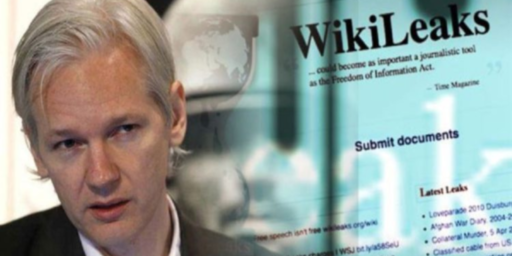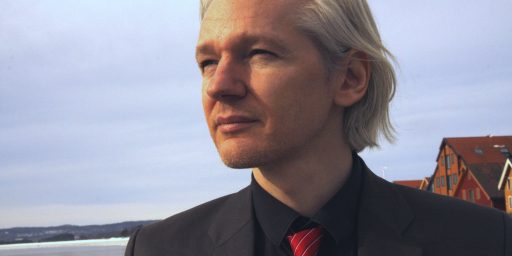Bradley Manning To Face Court Martial On Espionage Charges
Not surprisingly, the Commander of the Military District of Washington has chosen to accept the findings of a preliminary hearing held last year, and ordered that Pfc. Bradley Manning face a General Court Martial for the charges that he stole hundreds of thousands of pages of classified documents which eventually ended up in the hands of Wikileaks:
The commander of the Military District of Washington has ordered a court-martial for Pfc. Bradley E. Manning, the former intelligence analyst accused of giving hundreds of thousands of classified documents to the anti-secrecy group WikiLeaks.
Maj. Gen. Michael S. Linnington made the decision Friday after reviewing testimony and arguments from a preliminary hearing at Fort Meade in December, officials said.
There was no word on whether the as-yet-unscheduled court-martial would also be held at Fort Meade, one of three installations within the military district equipped to host such a proceeding.
Manning, 24, is charged with aiding the enemy and violating the Espionage Act. If convicted, he could be sentenced to life in prison.
Manning is accused of sending raw field reports from Iraq and Afghanistan, diplomatic cables from U.S. embassies around the world and a video of a U.S. helicopter attack in Baghdad to be published online.
The U.S. Army Trial Judiciary will now assign a military judge, who will set a date for Manning’s arraignment, motion hearings and trial.
During a preliminary hearing in December, Army prosecutors called computer forensic investigators who testified that materials uploaded to WikiLeaks came from computers on which Manning worked.
Manning’s attorneys sought to portray him as a troubled young man who struggled with gender identity, was isolated from his fellow soldiers and should not have been given access to the classified materials.
Manning, who lived in Potomac and studied at Montgomery College before he enlisted in the Army in 2007, attended the hearing but did not speak. It was his first public appearance since his arrest in Iraq in May 2010.
During his detention, his case became a cause celebre among anti-war activists, who say the footage of the 2007 Apache helicopter attack that he is alleged to have released appears to show evidence of a war crime.
At least one of the charges against Manning, Aiding The Enemy, carries with it a potential death sentence but it appears that military prosecutors will demur from seeking that sentence and instead ask for life in prison. Between that charge and the others than Manning faces it’s fairly certain that, if convicted, he would never see the outside of a military prison again for the rest of his life. Judging from last year’s preliminary hearing, the outcome of the case hardly seems to be in doubt. Manning’s lawyers offered no real defense at that hearing, not that they were required to, but it was rather clear from the arguments they did make that they didn’t really have much to argue on their clients’ behalf beyond questioning and testing the elements of the prosecutions case. The logical thing at this point would be for them to try to cut a deal on Manning’s behalf, but it’s possible that Manning himself doesn’t want to plead guilty.
The other unresolved question in the Manning case, of course, is the status of Julian Assange and others associated with Wikileaks. As I noted while the hearing was ongoing, military prosecutors revealed at the time that they had recovered online communications between Manning and Assange that apparently predated the time when Manning stole the classified material. This material has been turned over to civilian prosecutors who are apparently investigating the matter further. Whether there’s enough there to charge Assange under the Espionage Act or anyone else remains unclear at this time, though. Of course, American prosecutors probably aren’t in a rush when it comes to getting something on Assange, he remains under house arrest in the United Kingdom where he’s fighting an order that he be extradited to Sweden to face rape charges. If we want him, we’re going to know where to find him.





Manning should be charged with treason. What he did can be considered treason. That charge would be not very hard to prove.
Particularly since Assange is not a US citizen and was not in the US at the time this was going on. It would be like charging Vladimir Putin with espionage because he was the head of the KGB at one point.
— Article III, Section 3, United States Constitution
@Stormy Dragon:
Depending on which statute they proceed under, a foreigner who conspires with an American to break a specific law could indeed face charges for their actions. The Putin analogy is inexact largely because he was an official of a foreign government. Assange was a self-important hipster.
@Stan25:
Yes it would. You’d have to find two people to testify in open court that they witnessed him sending classified stuff to another party. It’s unlikely Manning was doing this in front of an audience. The prosecution would also have to prove Manning intentionally did it to aid the enemies of the US in making war against US, rather than (as it actually appears) out of a belief the American people deserved to have access to those documents.
Which is not to say Manning was right in presuming to be the sole arbiter what should and should not be released, just that his intent in doing so was not hostile.
@Doug Mataconis:
Hmmm, looking at the actual Espionage act, there originally was a section limiting it to acts occuring within the jurisdiction of the United States, but that was explicitly repealed in 1961:
http://www.law.cornell.edu/uscode/18/791.html
Seeing as there’s no language anywhere in the act explicitly absolving foreign officials of complying with it, I don’t see what (other than custom) prevents someone like Vladimir Putin from being charged under the act.
Stormy,
Yes but the Espionage Act isn’t the only potential statute that Assange could face liability under. I’m not saying it will happen, but I have no doubt that if the US Attorney’s office can find a way to make the charges stick they’ll do it.
@Doug Mataconis:
My point was more about what the law is, not the ability of prosecuter to obtain a conviction, which (if you pardon my cynicism) sometimes has nothing to do with what the law is.
Stormy,
What I’m saying is that there may be statutes beyond the Espionage Act that would apply to these facts. The first hurdle for the prosecutor would be getting past a motion to dismiss, and I’m sure they’re taking that into consideration before they bring charges, if they ever do.
Putin, as head of state, is basically immune, under laws and treaties governing sovereignty, to prosecution for espionage. Were he a spy captured in the US, that would not be the case.
As for Assange, it’s not quite so clear cut. Manning, though, is in a world of hurt, even had he not transmitted his downloads to others, the mere downloading would have put him in jail forever.
And contra Stormy Dragon, the act of downloading the files does not need to have been observed. The two observers only need note that indeed, files were downloaded and published to others not authorized to have them. Whether this illegal act rises to the level of treason is going to be–at least in part–determined by the amount of damage resulting from it.
@John Burgess:
It does to make it treason. As per the constitution, you have to have two witness testify to the same overt act in open court.
@John Burgess:
That’s my point though. Assange has not been captured in the US. Prosecuting Assange would be the equivalent of catching an FIS spy in the US and then trying to prosecute his superior who never left Russia.
@Stormy Dragon: I think the ‘overt act’ could easily enough be defined by the fact that more than two people saw the classified documents in places where they should not have been. The ‘overt act’ was the publication, not the initial downloading. Observing an assassination would not require seeing the assassin load the gun, just that the assassination had taken place.
A spy caught performing outside the US could be brought to the US. It might be easier, though to either report him to local authorities–if they were likely to do anything about that–or simply kill him. Both have happened.
espionage laws were made for spies & treason, for benefiting another country and self at the expense of the US; what Manning, Ellsberg & Assange did in disseminating truth was to benefit the American people & democracy–not by profiting from the information but by making it freely available to citizens–“popular information.” without which, we are both farce & tragedy; not to mention, no longer a democracy based on informed consent of the governed.